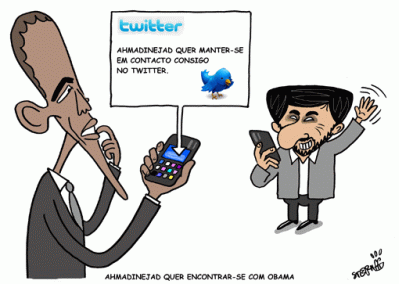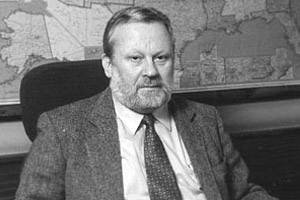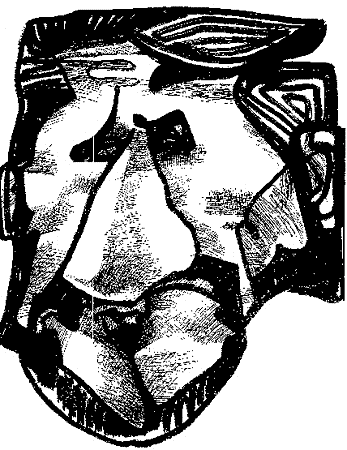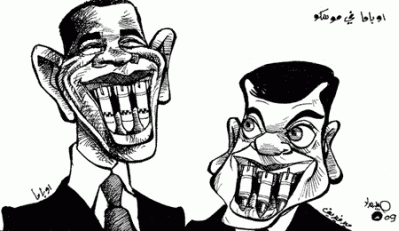
OBAMA'S BLACKBERRY: 'AHMADINEJAD
WOULD LIKE
TO FOLLOW YOU ON TWITTER'
CAPTION: 'AHMADINEJAD
WANTS TO FOLLOW OBAMA'
[Hoje
Macau, Macau]
Gazeta, Russia
Ahmadinejad 'Must
Be Offered Something'
"Russia
doesn't have complete freedom of action: we have various types of relations
with Iran. We have economic relations, relations on energy - and a partnership within
the Shanghai Cooperation Organization. For Russia, friendly relations with Iran
must be preserved. Therefore, we're more limited - we have less freedom of
action on the Iranian question than the United States."
-Victor Kremenyuk, deputy director of the Institute of
the USA and Canada at the Russian
Academy of Sciences
Interview
with Victor
Kremenyuk
† † ††  †
†
Conducted
by Svetlana
Yaroshevskaya
Translated By Yekaterina Blinova
June 27, 2009
Russia - Gazeta - Original Article (Russian)
In regard to the
possibility of improved relations between Iran and the U.S. and what role
Russia might play, Victor Kremenyuk, the deputy director of the
Institute of the USA and Canada at the Russian Academy of Sciences, spoke to Gazeta.
GAZETA: Talk
of the possibility of a dialogue between the United States and Iran began well before
the presidential election in the United States. Can we now say that such
forecasts were justified?
VICTOR KREMENYUK: So far, not really. Perhaps it's too early. Publicly, virtually
nothing has been said about a dialogue - and nothing has been done. In my
opinion, that's because Washington was waiting to the last minute to see who
would win the Iranian [presidential] election. There were hopes that Moussavi,
considered to be the least ideological candidate, would win. Perhaps it would have
been easier and more convenient to have congratulated him on his victory as a
way of improving relations. But the winner was Ahmadinejad.
Therefore efforts must be
directed at him, he must be offered something. Moreover, speaking of his
election victory, Ahmadinejad decided to borrow this idea from Moussavi and
expressed a readiness for dialogue with the United States. It can therefore be expected
that both Washington and Teheran will take some steps toward reconciliation.
But the intervening factor mixed into this is instability in Teheran, and as
far as that goes, the wisest decision on the part of the American president would
be to wait and see how the oppositionís challenges [to the results] play out.
GAZETA: There
is a general view that who actually won the election isn't so critical, because
the Ayatollah Khomeiniís opinion is the deciding factor.
VICTOR KREMENYUK: In my opinion, this is a realm of speculation and fantasy. Ayatollah
Khomeini is a religious leader for whom America isn't a state, nor a potential
partner, but a Satan. Therefore, he cannot express sympathy for the United
States.
At the same time, Iran needs
to resolve the problems that have accumulated. One segment of the Iranian
political class sees increasing aggressiveness and support for radical
movements as the solution (this is Ahmadinejad and his supporters). Others are
aware that Iran needs to modernize, that it needs to improve manufacturing in
many of its industries. Iran is an industrialized country, but it cannot
compete on an international level. It is being left behind technologically, it
needs to update its technological infrastructure, and in order to do this, it
needs to improve relations with countries that could share these technologies:
for instance, Germany, France and Russia.

'AHMADINEJAD'
[Al-Ahram,
Egypt]
GAZETA: How
do you interpret the way Ahmadinejad has remained in power - does it mean the
preservation of the old order, or perhaps, particularly under the influence of opposition-minded
citizens, that he will behave differently?
VICTOR KREMENYUK: Ahmadinejad isn't one of those political leaders whose can be
predicted. He's full of surprises and might behave in a number of different
ways, but I think that he has squeezed all he could out of the confrontation
with America. He demonstrated toughness, firmness, even aggressiveness - and loyalty
to the ideals of the Islamic Revolution. But now, life goes on.
What if the policy of
confrontation with the United States culminates in, let us say, a major
military strike on Iran? Iran is likely to be the loser, and then Ahmadinejad,
with all his bravado, will find himself in a very unenviable situation.
He had a very awkward end to
his term. And this is why there is reason to think about resolving the gridlock
with the United States, and, if Obama will give him any hint, I think he will
respond.
GAZETA: In
what format will this reconciliation occur?
VICTOR KREMENYUK: One of many. Since the American hostages were seized in 1979, many
problems have accumulated. For instance, the freezing of Iranian assets and the
U.S. blockade of Iran. They can begin with small steps, removing, one by one,
the restrictions and prohibitions that the U.S. imposed 30 years ago. They could
start with a downright breakthrough: organize a meeting between Obama and
Ahmadinejad, in, letís say, New York or Europe. They could begin with almost
anything. But then again, first we'll have to wait until the end of the current
clash between the regime and the opposition.
GAZETA: Will
the parties impose preconditions? Will both the U.S. and Iran ask for something
before the start of the negotiations?
VICTOR KREMENYUK: Anything's possible, including this. But raising preconditions would
render the entire venture meaningless.
Preconditions almost always
predetermine the failure of these types of initiatives. If Obama decides to
demand something from Ahmadinejad beforehand, why would he agree? And vice
versa.
Posted
by WORLDMEETS.US
If there is a desire to negotiate,
they shouldn't begin with a dictation of conditions. There are motives for
reconciliation on both sides, but the situation is extremely fragile and can be
easily destroyed.
GAZETA: Do
you think all of the scenarios for the development of U.S.-Iranian relations
[discussed before the Iranian election] are still possible?
VICTOR KREMENYUK: I would like to say no - that everything has changed and some options
have been eliminated. But I can't say that. I wouldn't even rule out the
possibility of a military strike on Iran. And Obama himself wouldn't make
promises about this. He would no doubt want the Iranians to understand that if
the talks go badly, they could receive a powerful strike. And no one will here
will stop Obama. So why would he say that he wonít strike? Let the Iranians
think that that he can and will.
GAZETA: At
the summit in Moscow, could Obama raise the issue of Iran and try to include
Russia in the establishment of a dialogue with Iran?
VICTOR KREMENYUK: Of course, the United States wants Russia to participate in this - and
help mend relations with Iran. For Russia, there are indeed opportunities in
this direction, but not great ones.
Russia doesn't have complete
freedom of action: we have various types of relations with Iran. We have
economic relations, relations on energy - and a partnership within the SCO [Shanghai
Cooperation Organization]. For Russia, friendly relations
with Iran must be preserved. Therefore, we're more limited - we have less
freedom on the Iranian question than the United States.
Both we and the United States
are at the stage of determining the entire range of relations at a number of levels:
strategic, regional and bilateral. It is very important to maintain a balance,
so that this time, it doesn't work out as though we're conceding something. For
instance, for withdrawing troops from Europe, we would see in exchange a halt
to NATO expansion. This is a complicated and delicate question. We can take a
step toward the United States, and help them, but at the same time we must
under no circumstances do so in way that damages our own interests.

[Al-Ahram,
Egypt]
GAZETA: Will
our position be clarified before Obamaís visit to Moscow?
VICTOR KREMENYUK: I wouldn't try to speculate or comment on it. Obamaís visit isn't
about this.
Number one on the agenda, the
most important thing, the START treaty, must be signed come hell or high water
before the year ends. Obama has to discuss START II - and get a feeling for
whether Medvedev will take steps to meet him on this. This is such an important
question that theoretically, the two diplomatic teams could be put around the
table, locked in a room, and kept there until the text of the treaty is ready. †
Posted
by WORLDMEETS.US
On the other hand, how long
will this be a top priority? No, of course neither Russia nor the United States
want this. Then, other questions could be raised - regarding cooperation on a
different set of problems: Afghanistan, Pakistan, Iran, Iraq and the Middle East,
the Caucuses, Georgia, the Balkans, Ukraine. There are a lot of issues that we
need to address positions on each need to be defined: where must we fight to
the death - where we can bargain. Diplomats on both sides are undoubtedly working
day and night to prepare the agenda. But the final word can only be uttered by
the presidents, and only after they talk, understand one another and decide for
themselves: is extensive cooperation possible or not? That is when there will
be more clarity with regard to Iran.
But first we must have
success with the START treaty. This will make success on other agenda items
possible.
GAZETA: Is
the North Korean scenario available to Iran?
VICTOR KREMENYUK: It may use these tactics. But Iran doesn't have the same goals as
North Korea. North Korea's bomb is essential to it: it is the only way their
regime can survive. This isn't the problem in Iran. For them, the nuclear
program is more of an ambition, and it always sounds different - and has a
different price - than a strategy of survival. The same tactic can be used, but
not the same strategy, so it sounds completely different. And Iranian and North
Korean strategies for relations with the West bare no comparison.
CLICK HERE FOR RUSSIAN VERSION
[Posted
by WORLDMEETS.US July 15, 9:23pm]